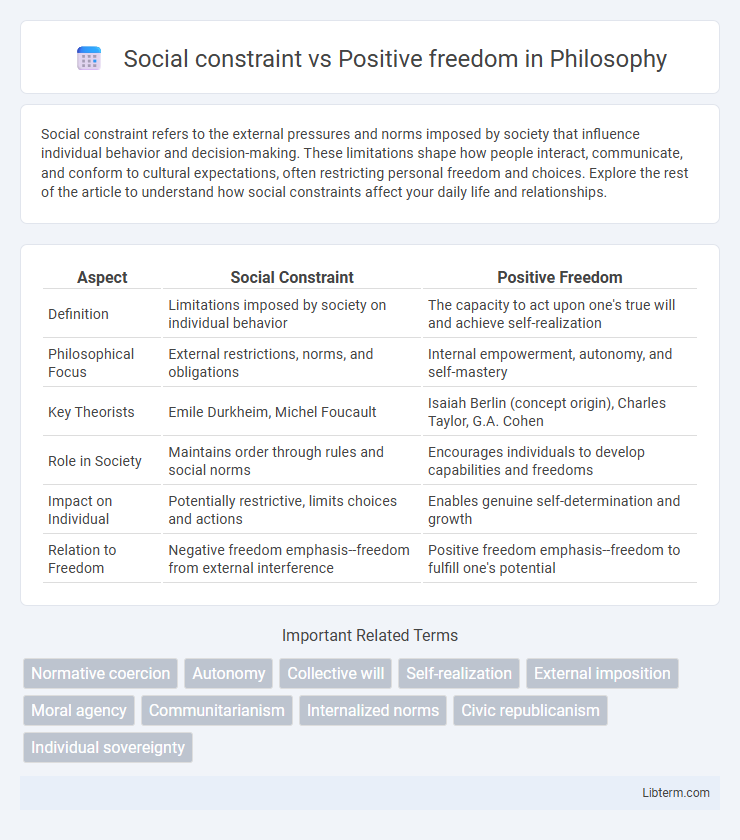Social constraint refers to the external pressures and norms imposed by society that influence individual behavior and decision-making. These limitations shape how people interact, communicate, and conform to cultural expectations, often restricting personal freedom and choices. Explore the rest of the article to understand how social constraints affect your daily life and relationships.
Table of Comparison
| Aspect | Social Constraint | Positive Freedom |
|---|---|---|
| Definition | Limitations imposed by society on individual behavior | The capacity to act upon one's true will and achieve self-realization |
| Philosophical Focus | External restrictions, norms, and obligations | Internal empowerment, autonomy, and self-mastery |
| Key Theorists | Emile Durkheim, Michel Foucault | Isaiah Berlin (concept origin), Charles Taylor, G.A. Cohen |
| Role in Society | Maintains order through rules and social norms | Encourages individuals to develop capabilities and freedoms |
| Impact on Individual | Potentially restrictive, limits choices and actions | Enables genuine self-determination and growth |
| Relation to Freedom | Negative freedom emphasis--freedom from external interference | Positive freedom emphasis--freedom to fulfill one's potential |
Understanding Social Constraint: Definition and Scope
Social constraint refers to the limitations imposed by societal norms, laws, and institutions that restrict individual actions and choices. It encompasses formal regulations such as legal restrictions, as well as informal pressures like cultural expectations and social roles that shape behavior. Understanding social constraint involves analyzing how these external factors influence personal autonomy and the degree to which they enable or hinder positive freedom--the capacity to act according to one's true interests and self-determined goals.
Positive Freedom: Meaning and Philosophical Roots
Positive freedom refers to the ability of individuals to realize their own potential and make meaningful choices, emphasizing self-mastery and autonomy. Rooted in the philosophical works of Isaiah Berlin and earlier thinkers like Georg Wilhelm Friedrich Hegel, it contrasts with social constraint by highlighting empowerment rather than mere absence of interference. This concept underscores the importance of enabling conditions such as education, social justice, and economic opportunity for true personal freedom to flourish.
Historical Evolution of Social Constraints
Social constraints have evolved historically from rigid class systems and institutional controls designed to maintain social order and limit individual agency, to more complex regulatory frameworks aimed at balancing societal interests with personal freedoms. The rise of democratic governance and human rights movements in the 18th and 19th centuries marked significant shifts, reducing arbitrary social constraints and promoting positive freedom--empowering individuals to pursue self-mastery and meaningful choices. Industrialization and modernization further transformed social constraints by introducing legal protections and welfare policies that support positive freedom through expanded access to education, economic opportunities, and political participation.
Theories and Thinkers on Positive Freedom
Positive freedom, emphasized by Isaiah Berlin and Charles Taylor, is the capacity to act according to one's true self and authentic desires, contrasting with social constraint that limits individual autonomy. Berlin's theory distinguishes it as self-mastery and control over internal and external circumstances, while Taylor highlights the social and cultural conditions enabling genuine self-realization. These thinkers argue that positive freedom requires freedom from external social constraints and the empowerment provided by social structures that foster individual development.
Social Constraint and Individual Autonomy
Social constraint limits individual autonomy by imposing external restrictions on personal choices and actions, often through societal norms, laws, or economic conditions that restrict freedom. These constraints shape behavior by controlling opportunities and resources, thereby impacting one's ability to act independently. Understanding social constraint highlights the tension between collective norms and individual autonomy in the exercise of positive freedom.
Positive Freedom in Contemporary Societies
Positive freedom in contemporary societies emphasizes the capacity of individuals to realize their true potential through access to education, healthcare, and social support systems. It contrasts with social constraints by advocating for structures that empower, rather than limit, personal development and autonomous decision-making. Modern policy frameworks increasingly recognize positive freedom as essential for social justice and equitable participation in democratic processes.
Tension Between Social Constraint and Positive Freedom
The tension between social constraint and positive freedom highlights the conflict between societal rules that limit individual actions and the capacity for self-realization and autonomy. Social constraints often impose norms and regulations that restrict personal choices, while positive freedom emphasizes the empowerment to pursue one's own goals and fulfill potential. Balancing these forces is crucial in political philosophy, as excessive social constraints can stifle liberty, yet unregulated freedom may undermine social order and collective well-being.
Impact of Social Norms on Freedom
Social norms significantly shape individual freedom by imposing unwritten rules that restrict choices and behaviors, thereby reinforcing social constraints. Positive freedom, understood as the capacity to act upon one's free will, often depends on the extent to which social norms enable or hinder genuine self-realization. The tension between social constraint and positive freedom highlights how societal expectations can both limit autonomy and provide a framework for meaningful personal development.
Policy Implications: Balancing Constraint and Freedom
Policy implications of social constraint versus positive freedom require a nuanced approach that balances regulatory measures with individual autonomy to foster equitable opportunities and social justice. Effective policies must limit harmful behaviors, such as discrimination or exploitation, while enhancing citizens' capabilities to pursue meaningful choices through access to education, healthcare, and economic resources. Striking this balance promotes social cohesion and empowers individuals without imposing excessive limitations on personal freedom.
Future Perspectives on Liberty and Social Order
Future perspectives on liberty emphasize balancing social constraints with positive freedom to create cohesive social orders that promote individual agency. This balance requires reimagining liberty not merely as absence of interference but as the capacity to fulfill one's potential within supportive societal frameworks. Emerging models advocate integrating social safety nets and participatory governance to enhance both freedom and social justice, ensuring equitable opportunities for all members of society.
Social constraint Infographic

 libterm.com
libterm.com